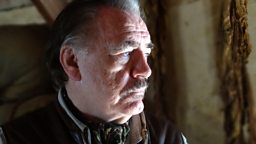Was Andrew Carnegie the Bill Gates of his time?
By who provided the voice of Andrew Carnegie in and who feels a deep connection with the man he considers to be one of the greatest philanthropists that ever lived.
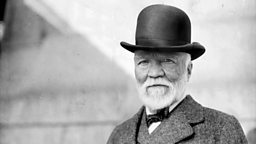
I’ve been aware of Andrew Carnegie since childhood.
“Who do you think I am, Andrew Carnegie?”My mother
When I asked my mother for money, she would always respond with, “Who do you think I am, Andrew Carnegie?”
I became reacquainted with him, and his effect on the commercial life of United States, during the filming of in Pittsburgh in 1996.
As an actor, Carnegie’s character very much rang true to me: the struggle he had as a child very much reflected the struggle I had as a child.
Becoming the man he became clearly required enormous self-determination — a highly motivated individual with ambition who could and would create great things. In my younger life, I was very much driven by the same resolve.
The appeal of Carnegie and his complexity lies in his whole attitude towards his business acumen and financial success.
He was an endless seeker of information, a great believer in the power of education and a master philanthropist.
He believed firmly against the notion of inherited wealth. He was a fierce capitalist with deep social and democratic tendencies.
About Brian Cox
Born in Dundee in 1946, Scottish-born Brian Cox, CBE, has forged a highly successful career in the limelight, using his public platform to voice his support in bettering the UK educational system as current Rector at Dundee University.
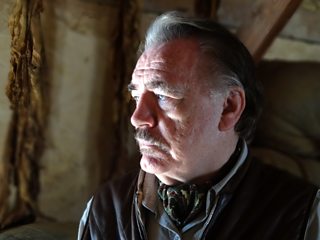
Humble beginnings, feudal societies and greatness
Although he loved his country, his sense of deprivation and loss of control – along with seeing how his father struggled to adjust to the American way of life – greatly motivated his proactivity.
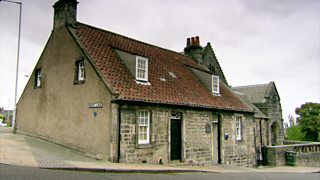
I can relate to this, having lost my father at the age of 8.
I moved from being lower middle class to a class of extreme poverty and realised extremely quickly that my destiny was very much in my own hands.
I believe this to be a bond that Andrew and I share.
I didn’t realise it at the time, but the egalitarian-based culture represented in American movies influenced me strongly and had an impact on my ambitions.
Anything was possible and, somehow, this rubbed off on me in a very profound way.
Latterly, I realised that both Carnegie & I were products of a feudal society.
For example, English cinema never appealed to me because in its essence it propagated the nature of feudalism, whereas American cinema offered an entirely different perspective.
It was that perspective which drove my initial desire to be an actor in films — and that has never left me, even throughout my years of working in theatre.
It certainly created an ambitious drive in me back then to get out of my situation.
I will always be grateful to two people in my life: Bill Dewar & George Hackett who taught me at St Michael’s Junior Secondary School in Dundee.
These two men saw how misplaced I was in the school system and identified a potential in me that the school system would have otherwise overlooked.
I suspect that Carnegie had patrons, for example George Lauder, his uncle.
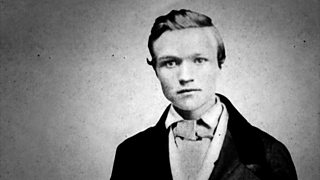
He was heavily influenced by his mother and I think his father played a formative role in the development of his humanity, his philanthropy and his fight against the war.
I think that, like any good Scot, Carnegie understood that greatness is not the goal. Instead, to him his work was its own reward, regardless of the financial incentive.
Uncle George Lauder
Carnegie’s uncle, George Lauder, played a huge part in his life, and in particular his education. His father spent much of his time at work but his uncle was around more as he was a local shopkeeper.
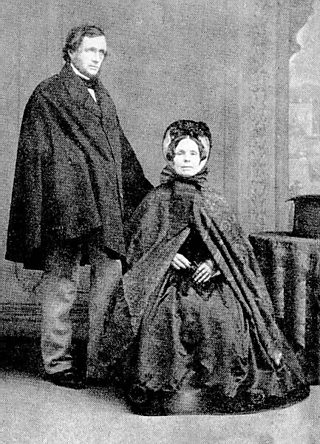
The man to whom I owe the most, and who was nearest and dearest to me of all men.Andrew Carnegie
After the death of his wife he found comfort in spending time with his only son and Andrew, teaching them much about British History.
In 1899 Andrew established a technical college in Dunfermline which was opened and named after Uncle George.
Heroism, patriotism & politics
He wasn’t a socialist; he was very much a capitalist — one way in which he & I differ greatly. He was also a philanthropist with an immensely compassionate nature and I believe these opposing traits were constantly at war within him.
Carnegie’s self-determination and the journey of his life are nothing short of awe-inspiringBrian Cox
He poured so much into his efforts to avoid the First World War – at which, unfortunately, he failed – and in a way I think it’s this failure which ultimately makes him a hero.
I didn’t consider myself to be patriotic until fairly recently, but as I have grown older I’ve begun to feel part a culture that has been so traduced and battered over the centuries.
The recent referendum for independence helped me realise that being part of what is essentially a feudal system has made me more fiercely Scottish.
I’m a proud Celt of Scots and Irish heritage: tribal but egalitarian. I’m all for freedom – individual freedom – and I believe that the group can (and should) be made up of individuals, working together for the benefit of all.
I suspect that Andrew and I would be political opposites.
We were both the product of experiencing financial hardship. In my earlier years I wasn’t very sensible with money, whereas Andrew exercised mastery over it quickly.
Though I believe we would have shared nationalist views, I approach from the left while I think he would have come from centre-right.
Carnegie’s legacy
Carnegie was the foundation of American industry.
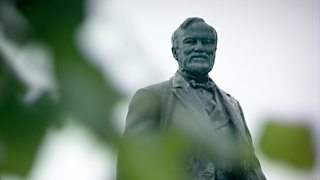
He was the Bill Gates of his generation and I believe he laid the foundations of modern capitalism.
As a great philanthropist, however, I think he would be horrified at the recent banking crisis and the merciless nature of capitalism today.
Carnegie’s giving nature was profound: contrary to the capitalists of today, he made money to give back to those without.
The world’s first Carnegie library
In 1879 Andrew Carnegie offered his native town of Dunfermline £5000 to build a library.
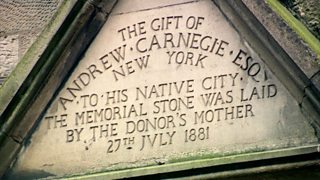
Thirty three years after they had left, his mother, Margaret Carnegie, returned and laid the memorial stone to the library in 1881.
The Central Library in Dunfermline was the world’s first Carnegie Library to open in August 1883.
